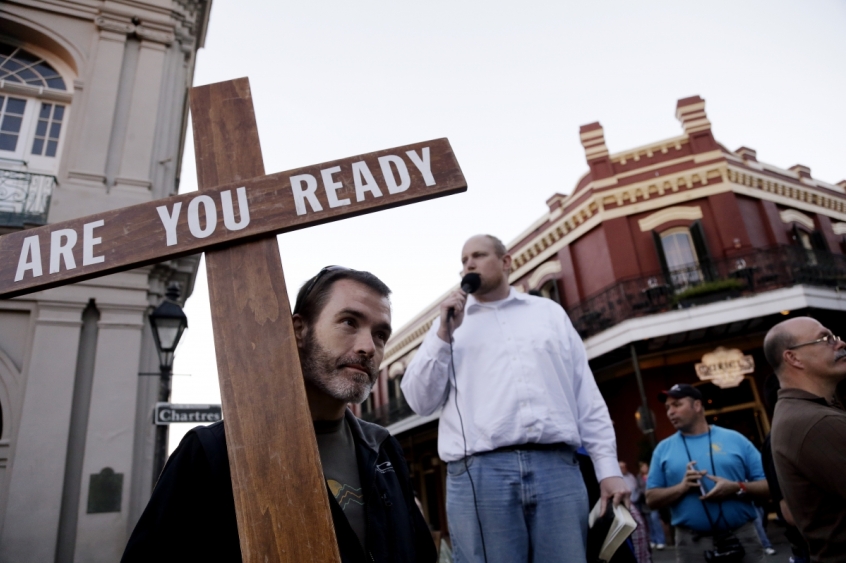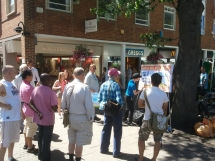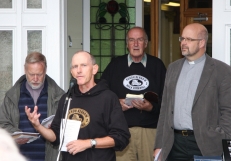
Every Sunday, Londoners gather at 'Speaker's Corner' in Hyde Park to talk, debate and preach about whatever they choose.
Historically mass protests occurred here in Hyde Park until the Parliament authorised public meetings and speakers in 1872.
Since then, this outdoor event has attracted religious speakers in particular who wish to voice their faith to the public. Luke 9: 5-7 reads: "Departing, they began going throughout the villages, preaching the gospel and healing everywhere."
Street preaching was encouraged as Biblical practise when Jesus came to Earth and has been since.
Those who are brave enough to take to the streets are therefore following the footsteps of Jesus and spreading the word of the Gospel as we are asked.
Even so, I cannot help but think that street speakers actually scare the public away from Christianity. We've all seen the eye-rolling of passers-by and it gets me wondering about the effect street preachers actually have on religious conversion.
Does preaching in local streets actually encourage people to turn to religion or discourage them? Do any members of the public convert to Christianity after hearing the Gospel proclaimed? Does anyone actually listen? I took to the streets of London for my own small experiment to ask people their thoughts.
Most people responded in the way I expected and seemed to confirm my own feelings on this - that street preaching is unappealing to non-believers and even to some religious people.
In my straw poll of 30 randomly selected people, I asked them whether they found street preaching uncomfortable. Twenty-one answered "yes".
One woman who did not wish to be named had this to say about street preaching: "It makes me sick to my stomach. It's offensive. It's the same if people come and knock on my door. I want to punch them."
Her husband was more relaxed about it, saying: "It's not a problem - I can take it or leave it."
Thirty-year-old Australian, Jo, had mixed feelings saying: "Because I'm from Australia we get a lot less of it than what I see when I'm in England, so I find it very strange. It's not something I come across very often.
"But I tend to think, each to their own. Everyone's entitled to say what they want to say and we're entitled to listen to it if we want to. But I think religion is a personal choice. You don't need anyone waving it around in your face."
Even two Christian women I spoke to, aged 20 and 22, questioned the impact of street preachers despite following the Gospel themselves. One said: "I think it doesn't show them in the right light as it's a bit full on. I think it has the opposite effect to what they want."
Interestingly one lady said that it was not that she disliked hearing the message of God but she simply got frustrated by preachers disrupting her daily routine, normally when she was in a rush, and found them to be "annoying".
Their comments suggest to me that people do not necessarily disapprove of the Gospel being proclaimed but rather there is something about the way it can be presented that makes it be perceived negatively. This brief encounter with the Gospel is for some their only encounter with it, so it is regrettable that it makes some want to turn and flee - or punch someone!
I was curious to hear from a street preacher directly about why they continue to preach in public despite the negative feedback.
The Reverend Josh Williamson, who was recently arrested in Scotland after engaging in open-air preaching, believes it is effective and that its effectiveness justifies it.
He said: "I have personally seen the lost converted, churches grow, and Christians encouraged by the work of open-air evangelism.
"One of the reasons I think it is effective is because it is The New Testament model of evangelism. If we follow Biblical models of evangelism we would do well."
Whilst my own experiment suggested that the majority of people find street preaching uncomfortable, Josh suggests the Gospel has to be preached regardless of how it makes people feel.
He said: "Every time the Gospel is preached it is a success. In fact, every person I preach to makes a decision in regards to Christ. Some decide for Him, others decide against Him. Either way they make a decision."
There is certainly an argument that we must take the Word to the street because most people avoid Churches and religious buildings entirely. But I wonder whether the public aren't encountering the right kind of street evangelism?
Some evangelists preach discreetly in the streets by framing unintimidating picture boards for example, or by engaging in casual conversations. Others perform Christian music busker-style. These methods may be better suited to today's society. After all, Jesus introduced street preaching over 2,000 years ago and modern society has changed profoundly. I asked Josh what he thought about the stereotype of the judgemental street preacher.
He had this to say: "What we need to realise is that God has called men to do different things, and in different ways. Not all open-air preachers are going to be the same. Sometimes a hard message of judgement is needed, other times it is not. We should examine all open-air preachers by asking 'Is what they are saying Biblical?'"
I ask myself, "What would Jesus do?", and whilst some like Josh would say street preaching, my own answer would be something more subtle, like spreading His word through our friends and family and the people we know. For when we have a relationship with someone surely they will be more acceptant of our religious beliefs? Alternatively, as a young Christian I have always been encouraged to act as a disciple rather than speak about it - as the saying goes: "actions speak louder than words."
In all honesty, talking to Josh did make me question my own opinion of street preachers. He has a point about not all preachers being argumentative and judgemental, and I certainly don't want to see them arrested.
Yet I find it hard to deny that their Biblical message is being overlooked and that, whether intentionally or not, most people avoid street preachers altogether because of this forceful stereotype. Some are no doubt being converted, but are many more being turned away, perhaps forever? That is my fear.
As Josh says himself: "Eternity will testify to how many people were saved by God in the open-air."















